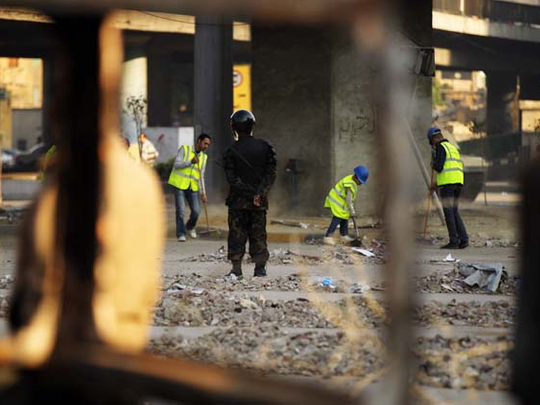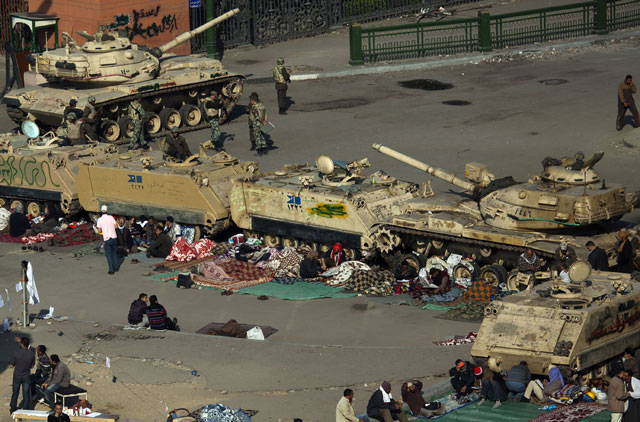
Cairo: Egypt's Muslim Brotherhood said on Wednesday it remains open to dialogue with the Egyptian regime, but repeated their demand for President Hosni Mubarak to leave office immediately.
"The president must leave his position. A new era should start," senior Brotherhood member and spokesman Mohammad Mursi told a press conference.
In pictures: Cairo protests enter 3rd week
Speaking as protests against Mubarak entered their 16th day, he said the organisation remained open to dialogue with the government.
The group has participated in talks with the regime, initiated by Egyptian Vice President Omar Sulaiman, but said the dialogue was not proceeding as they had hoped.
"The regime failed but it looks like some people think this dialogue is a monologue," Mursi said.
"We are with the people's will," said Mursi. "We are with the majority of the Egyptian people... We are not the majority."
Protesters stay adamant
Meanwhile, Egyptian pro-democracy campaigners reinforced their vigil in a Cairo square Wednesday.
Egypt's protesters and opposition groups were infuriated Wednesday by a warning from Vice President Omar Sulaiman that if their movement doesn't enter negotiations, a "coup" could take place causing greater chaos, as a mass demonstration in a central Cairo square entered its 16th day.
Sulaiman's sharply warning cast a shadow over his efforts, backed by the United States, to put together negotiations with the opposition over democratic reforms.
The protesters fear the regime will manipulate the talks and conduct only superficial reforms, so they insist they will enter substantive negotiations after President Hosni Mubarak steps down.
Thousands of protesters chanting "we are not leaving until he leaves" camped overnight in downtown Tahrir Square, the epicenter of their demonstrations, in tents made out of plastic tarps and bed covers to protect them from chilly weather, sprawling out into sidestreets. Many have been sleeping underneath the tanks of soldiers surrounding the square to prevent them from moving or trying to clear the area for traffic.
Tahrir has turned into a giant living room for the protesters, who wake early in the morning to mob the streets, distribute sweets and welcome visitors who come to take pictures with tanks and protesters' banners.
As speakers blared "Do not be tired. Do not be tired. Freedom isn't free," thousands of protesters remained camped under plastic sheets and the tracks of tanks, clinging to their "liberated" enclave on Cairo's Tahrir Square.
The night before they had been joined by several hundred thousand supporters for the biggest night of rallies yet in the two-week-old drive to topple their autocratic president and replace his 30-year-old regime.
"There can be no negotiation until he leaves. After he leaves we can talk about all sorts of things," said Essam Magdi, a 35-year-old lawyer, who has slept under an army tank since January 28 to prevent it from moving.
Egypt's 82-year-old president has deputised his vice president and former intelligence chief Omar Sulaiman to draw selected opposition groups into negotiations on democratic reform before elections in September.
Some parties have joined the talks, but the crowds in Tahrir insist that Mubarak must go before they will halt the protest. Sulaiman, however, warns that the transition must be slow and orderly if there is not to be chaos.
"A clear road map has been put in place with a set timetable to realise a peaceful and organised transfer of power," he said Tuesday on state television.
Afterwards, however, he told Egyptian editors that he would not allow "uncalculated and hasty steps" and warned "there will be no ending of the regime, nor a coup, because that means chaos."
The United States is watching events in the biggest country in the Arab world with great concern, hoping the transition to elected rule can take place without a descent into violence or an Islamist or military takeover.
Fearing revenge
Anti-government protesters are still staying on in Tahrir Square, but some fear revenge.
The trappings of a determined protest movement chanting, flags and raised fists - fill Tahrir Square, the hard-won enclave of those who seek a new Egypt. But some there fear an enemy within.
"We've heard about plainclothes security milling about in the crowd," said Salih Abdul Aziz, 39, who first joined protests at the square on Jan. 28, a day of intense clashes with riot police.
"We are careful in what we say to each other. And we don't talk politics very much to people we don't know."
The boldest challenge ever to President Hosni Mubarak's three decades of authoritarian rule has so far failed in its singular goal to oust him immediately.
And after initial euphoria over their defiance of a state once thought impregnable, protesters are increasingly uneasy that Mubarak or leaders he has chosen may manage to hang on to power.
If they do, there is a growing fear that the entrenched regime will try to exact revenge in the way it has done so many times before - mass arrests and abuse of detainees.
Many in Tahrir Square, the epicenter of the protests in Cairo, have noticed some in their midst who look out of place. They hold mobile telephones aloft, recording video of the panorama. The protesters suspect these are undercover police documenting who is attending the protests and fear that if they don't win far-reaching concessions soon, an emboldened security establishment will identify and round them up, one by one.
For decades, Egyptians have endured brutality and corruption at the hands of police, and fear is a part of their fiber.
A 30-year-old teacher who has met with government officials to discuss reforms said one of the protesters' main demands is the annulment of Egypt's repressive emergency laws, which the government has promised to lift eventually.
"This must happen. Otherwise we are not safe. We can be arrested anytime," said the teacher, who only gave her first name, Heba, for fear of government retribution.
The emergency laws expand police powers and sharply curtail rights to demonstrate and organize politically. The restrictions were imposed after the assassination of President Anwar Sadat in 1981, which led to Mubarak taking power.
A Human Rights Watch worker said she had heard of recent detentions involving "lower-level harassment" of people approaching Tahrir Square with blankets and other supplies, or for alleged violations of a nightly curfew.
"There are new reports every day," said rights activist Heba Morayef. "It's not all targeted."
The Arab Network for Human Rights Information, an Egyptian group, said a prominent Egyptian blogger has been missing since Sunday night.













